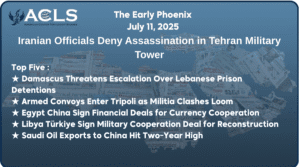Facing Existential Challenge at Home, the Iranian Regime Lashes Out in the Middle East and Beyond
The sixth week of the popular uprising against the Iranian regime of Ali Khamenei began with an alleged ISIS suicide attack on October 26 at a shrine in Shiraz that left at least 15 dead and culminated with a threat from the Iranian judiciary on November 1 to hold thousands of trials for those charged with inciting protests. The judiciary’s announcement raised concerns that Khamenei and his regime are planning to escalate their crackdown and set the stage for mass executions of protesters.
The alleged ISIS attack in Shiraz was the first such attack inside Iran since 2018. The commander of the IRGC used the aftermath of the attack as an opportunity to issue a stern public warning to protestors that “Today is the last day of riots.” The IRGC commander also accused the United States, the Israeli “Zionist regime,” and Saudi Arabia of plotting the “riots” in Iran after “suffering failures in Yemen, Iraq, Lebanon, and Syria” at the hands of the Iranian regime.
The IRGC warning had little effect on protestors, who continued to stage mass demonstrations across the country. Video of university students holding hands, dancing, and chanting “Death to the Dictator” in demonstrations throughout the country went viral on social media platforms less than twelve hours after the IRGC commander’s warning.
The protest story was joined during the week by a second story that went viral among Iranians: leaked photos of Iran’s hardliner Interior Minister Rostam Ghasemi on a recent holiday in Malaysia, embracing his unmarried girlfriend, who was not wearing a headscarf. The scandal outraged the Iranian public on two counts. First, Ghasemi, who publicly adopts a pious image and is one of the most prominent enforcers of the regime’s hyper-puritanical laws, displayed a shocking hypocrisy by cavorting with an unmarried woman, something his own ministry might arrest everyday Iranians for doing. Second, the fact that Ghasemi’s girlfriend’s hair was uncovered was shocking at a time when Ghasemi and the entirety of the Khamenei regime have beaten Iranian women like Mahsa Amini to death for doing the same. The scandal illustrates how the regime’s hypocritical, Taliban-style policies have alienated Iranians wholesale.
In response to the regime’s crackdowns, young activists have adopted a new tactic: filming themselves running up to unsuspecting clerics and knocking their turbans off their heads. Videos showing young Iranians carrying out this act of defiance are going viral among Iranians, amplified by such media and social media figures as Masih Alinejad.
Regionally, the Iranian regime announced its satisfaction with the Iraqi Iraqi government formation process that saw the Tehran-aligned Coordination Framework place its candidate, Muhammad Shia al-Sudani, into the Prime Minister’s office. Iran’s Foreign Minister Amir Abdollahian was one of the first to congratulate his Iraqi counterpart, Fuad Hussein, and express “hope for a further growth in cooperations between the two countries in all fields in this new stage.” During the week, Abdollahian also called his Azerbaijani counterpart to express Tehran’s “vehement” opposition to any foreign presence in the South Caucasus region. During the call, Abdollahian stressed that Tehran will only maintain the “regional mechanisms” that include the three South Caucasian countries of Armenia, Georgia, and Azerbaijan in addition to Russia, Turkey and Iran.
Internationally, after Ukraine last week revealed evidence that the Iranian regime is participating directly in the Ukraine war on Russia’s side, the European countries and the United States began to harden their attitude toward Tehran. Germany’s Foreign Minister announced at the beginning of the week that Berlin is considering placing new sanctions on Iranian officials. The German announcement came soon after more than 80,000 protesters gathered in Berlin to demand a tougher German stance against the Iranian regime and in support of the Iranian protest movement. The Iranian regime’s response came via Iranian media outlets closely associated with Supreme Leader Khamenei, several of whom warned that Germany is playing with fire by contemplating sanctions against the IRGC. The regime’s media outlets also asserted that such sanctions would be “illegal” because the IRGC is an official military organization of Iran.
Iranian regime representatives employed the same “illegality” argument in trying to fend off diplomatic action against them in the UN Security Council in New York. Addressing the growing allegations by countries such as the UK and France that Iran’s transfer of drones to Russia is a violation of UN Security Council Resolution 2231, Iran’s UN ambassador asserted that UNSCR 2231 does not apply to the sale of drones–a claim that would be surprising to the Obama administration and other UNSC members who drafted the resolution in 2015. Separately, Tehran Times reported that Iranian Foreign Minister Abdollahian phoned his Ukrainian counterpart to deny western claims that Tehran has provided Russia with drones for use in the Ukraine conflict. Perhaps in response to Abdollahian’s straight-faced denial, Ukraine President Zelensky released a video of himself standing next to a downed Iranian drone in Kyiv.
As for the United States, on November 1, the Iranian regime announced that it has sanctioned ten American individuals and four American entities after Iran’s intelligence ministry claimed that the United States and UK are “directly involved” in organizing the Iranian protests. The ministry also claimed to have apprehended hundreds of “terrorists” linked to the “Zionist regime” [aka Israel].
The Iranian regime’s “sanctions” fell on such U.S. individuals as CENTCOM commander Erik Kurilla, Deputy Treasury Secretary Wally Adeyemo, and former Treasury Department official Juan Zarate, though it was not immediately clear why Tehran would sanction American officials who have no financial interest in Iran and certainly no intention to try to visit Iran anytime soon. The Iranian regime also “sanctioned” the CIA, the 9th U.S. Air Force, the U.S. Army National Guard, and the private U.S. activist organization called United Against a Nuclear Iran–none of whom, as far as ACLS knows, have any financial exposure in Iran or members who would be seeking a visa to travel to Iran.



